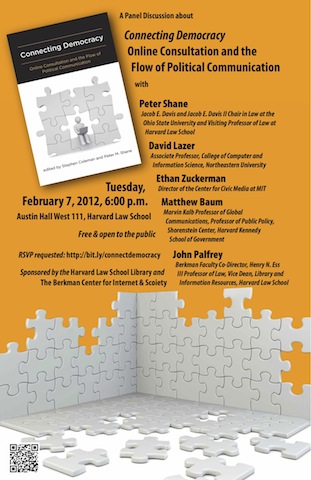Two doctoral students at the New Political Communication Unit have successfully defended their theses and been awarded PhDs in the last few weeks.
On 15 December Christopher Boerl was awarded his PhD for a thesis entitled, "A Kingdom Divided: New Media, the Fragmentation of Evangelical Cultural Values, and U.S. Politics". This is a wonderful success for Christopher, who first joined us from the United States in 2006 as a Masters student, before going on to register for his PhD in September 2007. His PhD was supervised by Professor Andrew Chadwick.
On 20 December Lawrence Ampofo was awarded his PhD for a thesis entitled, "Terrorism 3.0: Understanding Perceptions of Technology, Terrorism and Counter-Terrorism in Spain". This is again a tremendous achievement by Lawrence, who enrolled as a part-time PhD in September 2007 and has been running his own social media research company. His PhD was supervised by Professor Ben O'Loughlin.
Congratulations to both!
Here are the abstracts to the two theses:
Boerl: A Kingdom Divided: New Media, the Fragmentation of Evangelical Cultural Values, and U.S. Politics
Religious movements are a powerful force in politics, but there is no research that analyzes the relationship between new communication technologies and Christian political mobilization in the United States. In addressing this deficit, this thesis has three interrelated aims. First, beginning from an analysis of social capital, civic engagement and mobilization, it provides a historical overview of the U.S. evangelical community and its rise as a dominant cultural and political force. It argues that changing social norms provided the conditions for a strong reactionary religious movement to take root, while the social effects of broadcast media helped to concentrate evangelical energies on issues such as abortion, homosexuality, and school prayer. Second, this thesis develops an understanding of the impact of the Internet upon evangelical organizations based on original research and fieldwork. It demonstrates that in contrast to the effects of broadcast media, which served largely to unify evangelical cultural attitudes, the Internet is instead a source of significant theological fragmentation and political pluralization. By serving as a conduit through which dissident religious elements are better able to connect, organize, and mobilize, the Internet is revealed to be a powerful tool for movements such as “creation care” and the “emerging church,” which in years past have been unable to gather significant cultural strength due to the limitations of prevailing communication infrastructures. Collectively, these movements have emerged as a source of considerable unrest and internal religious division. Finally, this thesis discusses the political and electoral implications of a fragmented evangelical community and the ways in which the U.S. Democratic Party may capitalize on these developments.
Ampofo: Terrorism 3.0: Understanding Perceptions of Technology, Terrorism and Counter-Terrorism in Spain
This thesis tests the hypothesis that the availability of new technologies increases the capacities of terrorist and counter-terrorist agencies to achieve their communication objectives. The research question examined within this thesis focuses on the nature and extent to which terrorist or counter-terrorist organisations’ narratives affected the attitudes and behaviours of various Spanish-language audiences. This is analysed through an exploration of policy documents, event analyses, elite interviews, and internet research methods adapted by the author. The data illuminate the shifting understandings of communities of policymakers, journalists, activists and publics during the 2004 to 2011 period, and is the first such study undertaken in Spain. Five themes within the empirical data are examined closely: the relation of terrorism in Spain to immigration, the formation of narratives in relation to understandings of terrorism, terrorism and cybercrime within Spain, the nature of communities in relation to understandings of terrorism and terrorism in Spain in relation to public reaction to the death of Osama bin Laden. The hypothesis is derived from: the theses of Bobbitt (2008) and Barnett (2005) concerning technology’s role in the changing character of the state and terrorist organisations; research from terrorism studies literature concerning the role of technology in terrorist radicalisation, recruitment and communication; and public diplomacy studies that suggest political organisations should be able to communicate effectively to domestic and overseas publics through digital campaigns and initiatives. The main findings are: (i) the availability of technologies has not brought concomitant success for government or terrorist communication strategies; (ii) government narratives were not considered persuasive by general online users, refuting top-down communication models and raising questions about trust and credibility; (iii) online communities wish to engage and may contain key influencers who could be conduits or gatekeepers for government or terrorist narratives; (iv) terrorist organisations now have greater capacity to operationalise visibility and / or invisibility within their strategies; and (v) partly independent phenomena such as immigration and terrorism have been conflated or ‘commensurated’ into one ‘nexus’ of concern by Spanish policymakers and publics. The thesis considers how Web 3.0 is likely to bear upon these relationships, and recommends that counter-terrorist practitioners conduct further multilingual internet research into the attitudes and behaviours of online users and communities, especially the Spanish diaspora, in relation to terrorism to explore ways that communities can be co-opted into future counter-terrorism strategies in light of the development of Web 3.0 technologies. Such research could provide greater understanding of the nature of terrorism online, as well as new techniques of conducting strategic communications.






